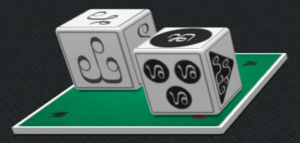Kwąt
 Two kwąt dice | |
| Years active | at least 50 |
|---|---|
| Genre(s) | Dice Gambling |
| Players | 3+ |
| Setup time | <1 minute |
| Playing time | 5 minutes - 30 minutes |
| Random chance | Ubiquitous |
| Skill(s) required | Luck |
| Synonym(s) | Dùùrang, Dyna |
Kwąt ("Partners", Awatese: [kwɐt]) is a gambling dice game (nguniřął pamąxuhą) originating in Awating. Among non-northern peoples, the game is called dùùrang in Ngigu and dyna in Bilemã (both meaning “stones”). The origin of the name in Awatese is disputed, but the general consensus is that it refers to the game’s focus on interaction with other players.
Dice (nguniřął) for kwąt are six-sided, specific to the game and are usually readily available around the country in retail. In rural areas with less access to retail dice, they are commonly carved out of wood or other similar materials and marked with markers or paint. The game is often played at family gatherings, during holidays, and in other casual settings.
History
[insert pre-1980s history here]
After Awatese sovereignty in 1981, kwąt saw increased usage among the younger generation due in part to the coinciding reawakening of national identity, as well to the reintroduction of the Awatese script to the educational curriculum. Kwąt is very commonly played by people across generations in Awating today, and the game often evokes a sense of nostalgia for those that had played the game often in childhood.
Rules
Setup
Kwąt is suitable for any number of players, but tends to be played in larger groups, usually of 3 to 5. Players sit in a circle formation so that there is a space in the middle for the dice to be thrown. Each person starts with an equal amount of tokens, usually 5 to 15 - these can be any object, e.g. coins, marbles, etc. The pot begins with 5 tokens by default, kept in a separate container in the middle throughout the game. Whenever the pot is emptied, all players put one token into the pot.
The oldest player goes first (sometimes changed in house rules to the youngest, the tallest, etc.) and play order is clockwise. Play begins when the first player takes a roll with either or both of the dice. A player may roll one die before the other, or they may roll both dice simultaneously. A player can also opt to pass their turn, but a very common rule goes that they may only do so three times in a row before having to take a turn.
Gameplay
One die shows the action that must be taken that turn. Each face of the die is inscribed with a letter of the Awatese script, standing for a verb root representing the action. This die is natively referred to as nguniřął a pemehąn, “acting die,” and is rolled first.
| Letter | Meaning | Description |
|---|---|---|
take |
The player takes the amount of tokens shown from the pot. | |
put |
The player puts the amount of tokens shown into the pot. | |
give |
The player gives the amount shown to the player on their right. | |
offer thanks |
The player receives the amount shown from the player on their right. | |
go around |
All players hand their tokens over to the person to their right so that everyone’s tokens are switched. Play resumes without rolling the second die. | |
push |
The player does nothing. Play resumes without rolling the second die. |
Another die shows the amount of tokens used for the action shown on the first die. When letters are included, the symbols shown for the fixed numerical values are digits in the Awatese script, while the other two symbols are the words spelled out in Awatese; many dice do not include letters and only show the shapes. This die is natively referred to as nguniřął a peząhąn, “counting die,” and may be rolled after the acting die or together with it.
| Symbol | Meaning | Description |
|---|---|---|
one |
One token. | |
two |
Two tokens. | |
three |
Three tokens. | |
half |
Half of the pot, or half of the player’s tokens. Rounds down to the nearest whole number. | |
all, every |
The entire pot, or all of the player’s tokens. | |
nothing |
No tokens. Play resumes without action. |
A player loses (becomes eliminated or “out”) when they run out of tokens or are otherwise unable to continue the game without running out of tokens. Unless using house rules, players cannot be “revived” using the effects of řąha and xahąx. The player who has tokens remaining in their possession is declared the winner.
Analysis
Kwąt is often cited as an unbalanced game that relies entirely on luck. The game is almost always played in very low-stakes environments, and usually legal tender is not used as tokens during the game, particularly because gambling is illegal in Awating but also because of the unbalanced nature of the game. As an example, the odds of the first turn of the game resulting in a loss for only that player is around 5.56%, and the odds of the first turn resulting in a loss for any player is 8.3%, both comparatively quite high. Therefore, games can vary widely in length, with most games being relatively short.